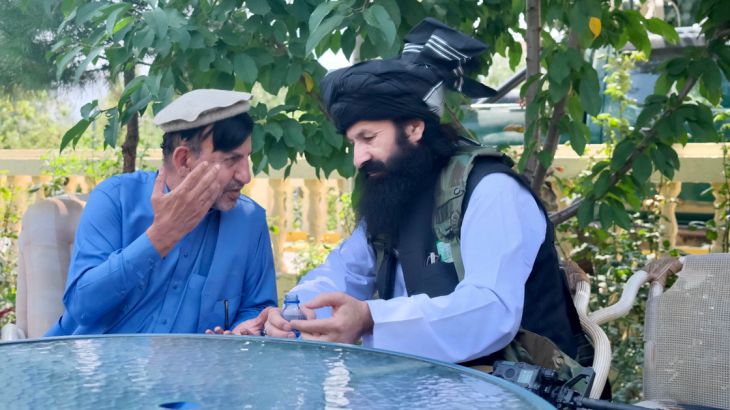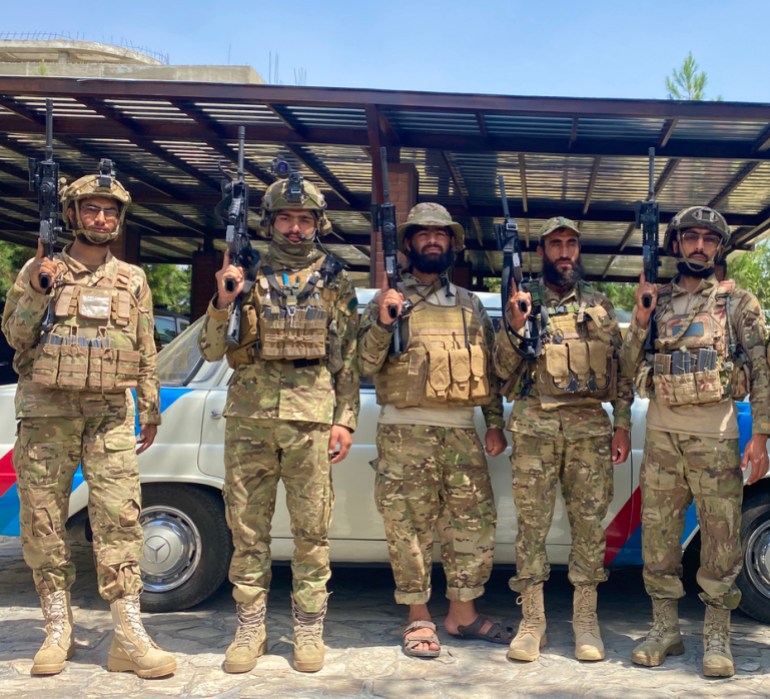‘All Afghans’ should feel safe under Taliban, says security chief
Haqqani tells Al Jazeera that Afghans should not fear the Taliban, but many people remain sceptical that their safety will be assured.

Kabul, Afghanistan – Khalil Ur-Rahman Haqqani, a leading Taliban figure currently in charge of security for Kabul, has echoed the group’s claims that “all Afghans” should feel safe under their Islamic Emirate, and that a “general amnesty” has been granted across the nation’s 34 provinces.
Speaking to Al Jazeera on Sunday, Haqqani, whose associates are also taking a leading role in establishing security in the capital, said the Taliban is working to restore order and safety to a nation that has seen more than four decades of war.
Keep reading
list of 4 itemsTaliban co-founder Mullah Baradar in Kabul for government talks
Afghans need to accept Taliban rule, says ex-president’s brother
Is the Taliban’s treatment of women really inspired by Sharia?
“If we can defeat superpowers, surely we can provide safety to the Afghan people,” Haqqani, who is also a veteran of the Afghan-Soviet war, said.
Many Afghans are sceptical that a leader of the Haqqani Network, known to be the most brutal and violent group associated with the Taliban, will bring security to Afghanistan after 40 years of war and violence – especially as reports of house-to-house searches and violence allegedly committed by the Taliban continue to pour in, including in Kabul.
Haqqani is still labelled a “global terrorist” by the United States, with a $5m bounty for him issued by the US Treasury Department in February 2011, and he remains on a United Nations terrorist list.
Haqqani’s statement also comes as thousands of people continue to try to get into Kabul’s Hamid Karzai International Airport, where Taliban, intelligence forces and US soldiers are actively trying to keep crowds desperately trying to flee the country from entering the premises.
Since the crowds first amassed near the airport last Sunday, there have been near-daily reports of violence, injuries, stampedes and deaths.
Yet, Haqqani insisted that people should not be afraid of the Taliban.
“Our hostility was with the occupation. There was a superpower that came from the outside to divide us. They forced a war unto us. We have no hostility with anyone, we are all Afghans,” he said.
Haqqani’s reference to a “forced” war, harkens back to a similar term often employed by the government of former President Ashraf Ghani. That government repeatedly referred to the Afghan conflict as an “imposed war”.
However, both sides differ in who they claim has brought war to Afghanistan. For the Taliban and Haqqani, it was the US and its coalition of 40 nations, whereas Ghani and his administration often blamed neighbouring Pakistan for the violence and discord in their nation by facilitating the Taliban and other armed groups – which Islamabad denies.
Now that foreign forces are less than 10 days from a complete withdrawal, Haqqani and the Taliban say they see no enemy on Afghan soil and instead want to work with as many people as possible to bring order to the nation.

Taliban leaders have sought to show a more moderate face since capturing Kabul last Sunday, and have begun talks on forming a government.
Haqqani points to recent meetings with former President Karzai, as well as Abdullah Abdullah, a member of the resistance against the Taliban’s initial rule in the 1990s, and Gul Agha Sherzai, the former minister of borders and tribal affairs as proof that the group is willing to embrace all Afghans.
“Karzai was in conflict with us for 13 years, but in the end, we assured even him of his safety,” Haqqani said in reference to the years Karzai spent as the head of the Western-backed Afghan government, which the Taliban often referred to as a “puppet” or “stooge” administration.
In another sign that the group is signalling a willingness to move on from past enmities, on Sunday the Taliban authorised Karzai and Abdullah to negotiate with Ahmad Massoud, son of the slain Tajik Mujahideen commander Ahmad Shah Massoud.
In the 1990s, the elder Massoud staged the only armed resistance to the Taliban’s strict five-year rule. There is fear that if the younger Massoud’s movement, which is being referred to as “Resistance 2.0” online, fails to reach a settlement with the Taliban, it could push Afghanistan back towards another civil war.
To further prove his point that the Taliban is standing by its promises of amnesty, Haqqani told Al Jazeera a story of his final interactions with the former national security adviser of Ghani’s government, Hamdullah Mohib.
“I was talking to Mohib, I told him not to leave, that he and President Ghani would be safe. I said ‘We will assure your security,’” Haqqani said of the British national who reportedly fled with the former president.
In statements posted to his Facebook, Ghani said he fled to avoid bloodshed and to save his life, claiming that his security warned him of a credible threat to kill him had he remained in the country.
Haqqani denies this claim.
“All of those people who left this country, we will assure them of their safety. You’re all welcome back in Afghanistan,” he said.
But for millions of Afghans, the words of Haqqani and Taliban spokesman Zabihullah Mujahid are not enough to see them return to the streets of Kabul. Across the capital, giant supermarkets remain closed, stores see minimal foot traffic and popular restaurants, cafes and shisha bars struggle to make ends meet with only a fraction of their former customer base.
Patricia Gossman, associate Asia director for Human Rights Watch, says that too often, references to security and order can pave the way to a police state.
“Law and order is not the same as rule of law. What we need to see is whether they will address concerns about searches of journalists’ and activists’ homes, and accountability for killings of former government personnel and media workers,” Gossman told Al Jazeera.
Meanwhile, Haqqani said the Taliban is working hard to try and keep other Afghans from fleeing, but that the circulation of what he says are unsubstantiated reports of abuse and violence is making it much more difficult.
He says “the whole world” is trying to “deceive” the people of Afghanistan with claims that the Taliban will eventually revert to the strict, brutal rule of the 1990s, which he vehemently denies.
This, he said, is why people are going to the airport, “where they are treated disgracefully”.
He says the educated people who are fleeing should work to serve their country rather than going to the airport, where they will face violence, humiliation and “disgrace”.
“We cannot build Afghanistan from the outside,” he said to those who are either waiting to leave or have already left.
He also referred to the last 20 years of foreign intervention that saw foreigners and Afghans coming from abroad to work in the country.
“Outsiders can’t build the nation for us. All they’ve done is destroy it.”